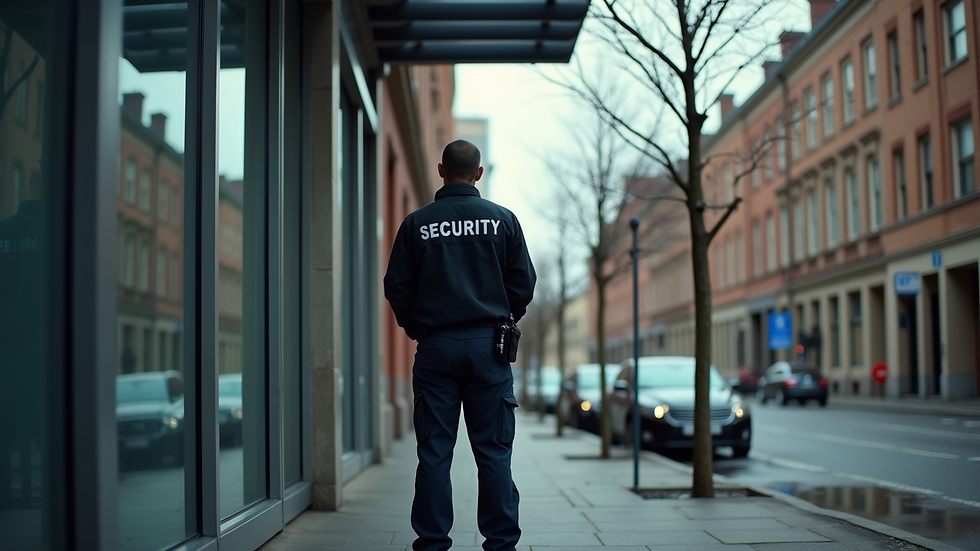Understanding the Requirements for Security Certification
- stevenwltrs
- Sep 1, 2025
- 3 min read
Security certification is a crucial step for anyone looking to enter or advance in the security industry. It ensures that security personnel are properly trained, knowledgeable, and prepared to handle various situations professionally and safely. This blog post will guide you through the essential requirements for obtaining security certification, focusing on practical information and actionable advice.
The Importance of Security Certification
Security certification is more than just a formality. It serves as proof that an individual has met specific standards and possesses the skills necessary to perform security duties effectively. Employers often require certification to ensure their security staff can protect people, property, and assets.
Certified security professionals are trained in areas such as:
Legal powers and limitations
Emergency response procedures
Conflict resolution techniques
Report writing and communication skills
Basic first aid and CPR
Having a recognized security certification can open doors to better job opportunities and higher pay. It also builds trust with clients and employers, demonstrating a commitment to professionalism and safety.

Key Requirements for Security Certification
To obtain security certification, candidates must meet several requirements that vary by state or region but generally include the following:
Age and Background Checks
Most jurisdictions require candidates to be at least 18 years old. A thorough background check is conducted to ensure the applicant has no criminal history that would disqualify them from working in security.
Training Hours
Candidates must complete a set number of training hours covering essential security topics. This training can be classroom-based, online, or a combination of both. The training ensures candidates understand their responsibilities and legal boundaries.
Written and Practical Exams
After training, candidates often must pass written and practical exams. These tests assess knowledge of security procedures, laws, and emergency response skills.
Licensing Application
Once training and exams are complete, candidates apply for a security license or certification through the appropriate regulatory body. This process may include submitting fingerprints and paying fees.
Continuing Education
Many regions require security professionals to complete continuing education or refresher courses to maintain their certification and stay updated on industry standards.

What is the 16 Hour Security Course in NY?
In New York, the 16-hour security course is a mandatory training program for security guards. It is designed to provide comprehensive instruction on the duties and responsibilities of security personnel.
The course covers topics such as:
Powers of arrest and legal limitations
Use of force guidelines
Emergency procedures and evacuation plans
Report writing and communication
Customer service and conflict management
This 16-hour course is typically divided into two 8-hour sessions and must be completed before applying for a security guard license in New York. It ensures that guards are well-prepared to handle real-world situations safely and professionally.
For those looking to fulfill this requirement without financial burden, there are options like the 8 and 16-hour security certificate free nyc program, which offers free training to eligible candidates.

Tips for Successfully Completing Security Certification
Achieving security certification requires dedication and preparation. Here are some practical tips to help you succeed:
Choose Accredited Training Providers
Ensure your training program is recognized by the relevant licensing authority. Accredited providers offer up-to-date and comprehensive courses.
Prepare for Exams
Review course materials thoroughly. Practice writing reports and familiarize yourself with legal concepts related to security work.
Attend All Training Sessions
Full attendance is often mandatory. Missing sessions can delay certification or require retaking parts of the course.
Stay Organized
Keep track of all documents, receipts, and certificates. You will need these when applying for your license.
Ask Questions
If any part of the training is unclear, seek clarification from instructors. Understanding the material fully is essential for passing exams and performing well on the job.
Maintain Physical Fitness
Some security roles require physical activity. Staying fit can improve your performance and confidence.
Beyond Certification: Building a Career in Security
Obtaining your security certification is just the beginning. To build a successful career, consider the following:
Gain Experience: Start with entry-level positions to build practical skills.
Specialize: Pursue additional certifications in areas like armed security, cybersecurity, or executive protection.
Network: Join professional security organizations to connect with industry peers.
Stay Updated: Laws and best practices change. Regularly update your knowledge through continuing education.
Develop Soft Skills: Communication, problem-solving, and customer service are vital in security roles.
By continuously improving your skills and knowledge, you can advance to supervisory or management positions within the security field.

Security certification is a vital credential that validates your ability to perform security duties effectively. Understanding the requirements and preparing thoroughly will help you achieve certification and build a rewarding career in the security industry. Whether you are just starting or looking to enhance your qualifications, investing in proper training and certification is a smart step toward professional success.





Comments